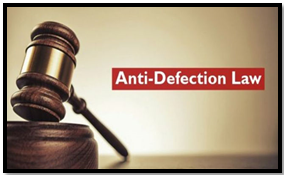ANTI DEFECTION LAW
Why in the News?
- Speaker came to the decision that Shinde faction is the real Shiv Sena.
Source: IDS
Key Provisions of Anti-Defection Law:
- Disqualification: A member of a House can be disqualified for:
- Voluntarily leaving their political party.
- Voting against the party’s direction without prior permission (if not condoned within 15 days).
- Independent Members: Independent members are disqualified if they join a political party after election.
- Nominated Members: Nominated members are disqualified if they join a political party after six months of taking office.
- Exceptions:
- Merger: Disqualification doesn’t apply if a party merges with another (with support from two-thirds of members).
- Presiding Officer: The presiding officer’s defection isn’t counted, but only during their tenure.
- Deciding Authority: Speaker or Council Chairman decides defection matters, and their decision is final and cannot be challenged.
- Rule-Making Power: Presiding officer can make rules to enforce these provisions, acting on complaints from members.
- Role of Whip: Whips communicate party positions and disobedience may lead to disciplinary action under anti-defection law.

 Source: IDS
Source: IDS

